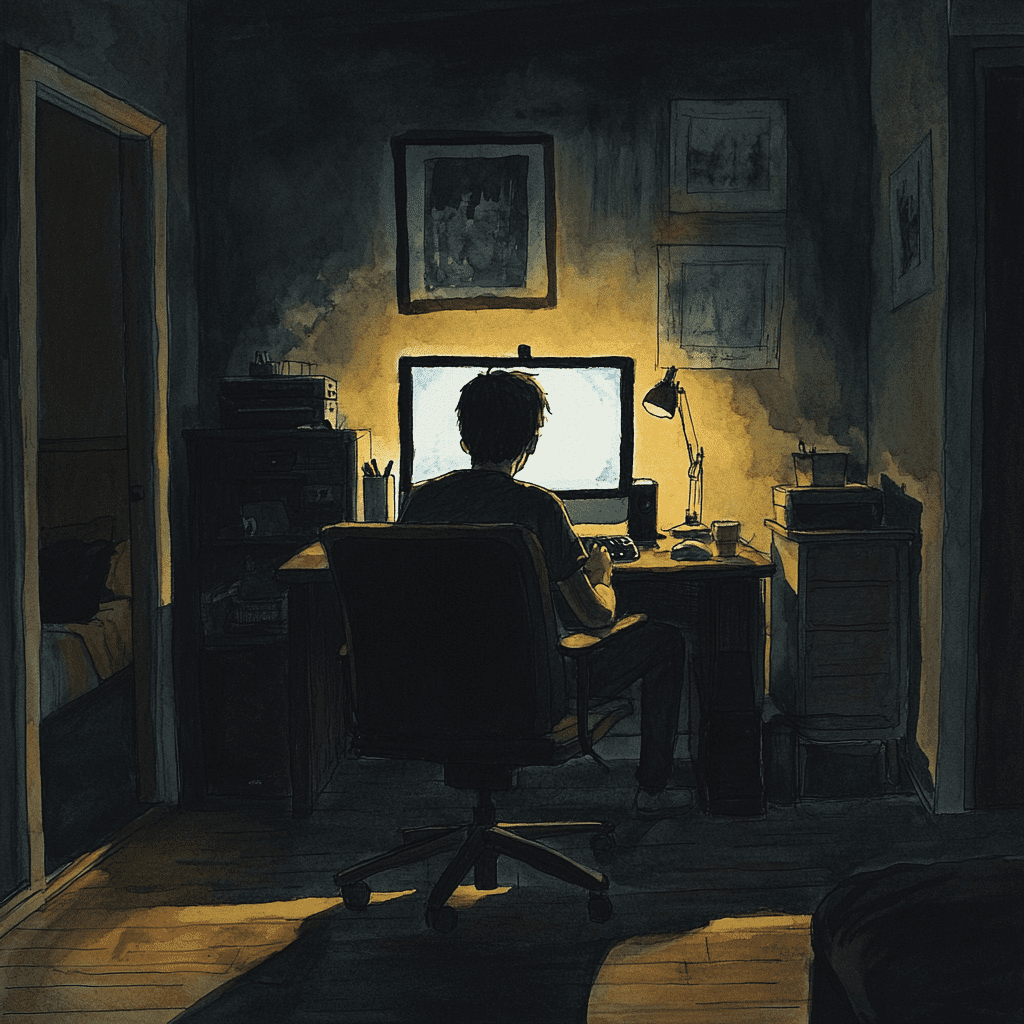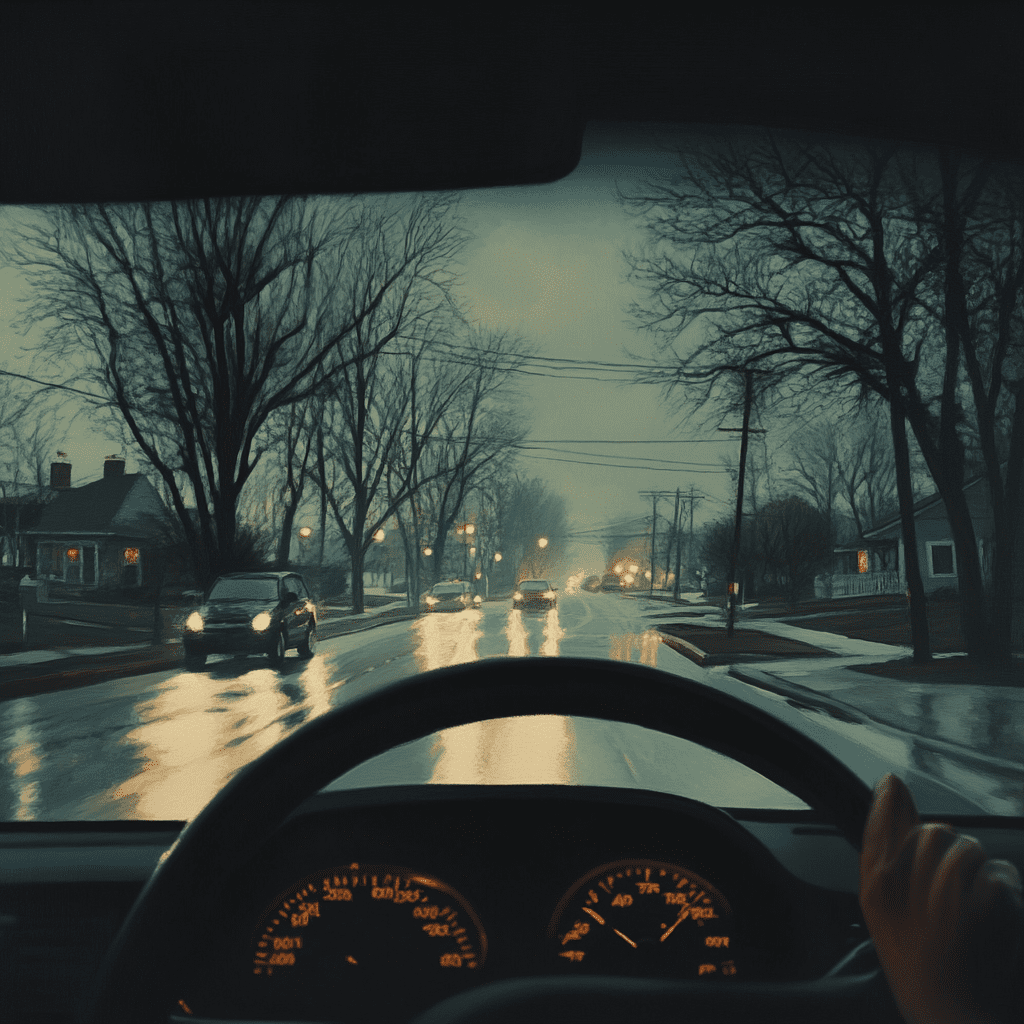It’s 6:12 AM.
I woke up 5AM this morning after a few hours of sleep.
Surprisingly I woke up with a lot of physical and mental energy, basically jumping out of bed ready to go.
I have this routine with my dog where the moment I wake up I cuddle and play with him.. this morning I had more energy than usual and so we wrestled for a few minutes before starting my day. It’s a great way to start the day!
My whole life, going back to my childhood, my sleep pattern has been inconsistent.
It started in my childhood, especially during my teenage years, when I would stay up late at night playing video game, staying up until 5-6 in the morning just before my mom got home from night shift. The moment she got him I knew I had to shut things down and hide (I was hypervigilant from an early age).
I learned from childhood that the early morning hours, when everyone else was asleep or away, became my time to relax and enjoy myself.
I didn’t want to waste that time sleeping, instead I played video games and worked on important projects.

I decided to sleep while others were up and about because it meant that they couldn’t ask me to do things for them, which I couldn’t say no to as a child.
It was weird times.
I always wondered why I enjoyed my mornings so much, and the moment the Sun started to rise, I felt this need to sleep, but reflecting on my past, when the Sun started to rise, that’s when my abusive family would wake up and start this sh*t (Lol).
My only recourse was to sleep while they were in their worst state of mind, the morning time, where they yell, make demands, criticize, control, belittle, etc etc.
Damn, it’s no wonder why I preferred night time.
Hypervigilance
I was thinking today of some odd patterns I have been observing.
I noticed when I was taking Vyvanse, I didn’t have intrusive thoughts. However when I stopped taking Vyvanse intrusive thoughts have returned.
I don’t know if it’s due to not being on Vyvanse anymore or the fact that my nervous system is dysregulated.
For example this morning as I’m driving to Starbucks I noticed my mind was hypervigilant about potholes in the road.
I had an incident 6 months ago where a pothole cracked one of my tire rims costing me $1500 to replace and ever since I’m super cautions about hitting potholes.

Another example, around my house the moment I spot something that can be triggering my mind races to some conclusions of the absolute worst case scenario for no reason.
My mind reacts so quickly to things I observe, playing things out so quickly to assess for danger when 99% of the time there is no danger. It’s like my mind is in flight or fight mode when it doesn’t have to be and I’m wondering how to get out of this hypervigilance and what causes this..
So let’s investigate!
First off what is Hypervigilance?
Hypervigilance is a heightened state of alertness where an individual is extremely aware of their surroundings, constantly scanning for potential threats or dangers.
This heightened awareness often occurs as a response to trauma or prolonged stress, leading the person to remain on guard even in safe environments.
While hypervigilance can be protective in genuinely dangerous situations, it becomes problematic when the individual perceives threat where there is none, leading to increased anxiety, difficulty relaxing, and challenges in social interactions (yep, this is me).
Hypervigilance is often associated with conditions like PTSD, anxiety disorders, and complex trauma.
Well that makes sense in my case! The past couple months I have been discussing C-PTSD and related symptoms on this blog here.
Why do we become Hypervigilant?
Hypervigilance often arises as a response to childhood trauma or intense, prolonged stress. Here are some common causes:
- Trauma and Post-Traumatic Stress Disorder (PTSD)
- Anxiety Disorders
- Childhood Trauma and Adverse Childhood Experiences (ACEs)
- Complex Trauma (C-PTSD)
- Neurological and Biological Factors
- Substance Use and Withdrawal
- High-Stress Environments
In my case it certainly relates to:
- Chronic Early-Life Stress: Childhood trauma or neglect can make the brain more sensitive to stress and danger, establishing hypervigilance as a long-term coping mechanism.
- Unsafe or Unpredictable Environment: Children growing up in unsafe or chaotic environments may become hypervigilant as a way of staying alert to potential dangers.
- Repeated or Long-Term Trauma: Individuals who experience long-term trauma, such as prolonged abuse, domestic violence, or combat exposure, can develop Complex PTSD. Hypervigilance is a common symptom, driven by an ingrained need to detect and avoid danger.
Based on the last few months posts on this blog where I talk about C-PTSD, it makes sense I’m hypervigilant.
I feel as if I’m scanning often and looking for danger when there isn’t danger. It’s like I’m in a warzone.
The problem with this as my mind finds cues for potential danger I then flashback to past experiences and relive it as if it’s happening now.
I stress myself out.
This is where C-PTSD becomes bad.
My mind is overactive, scanning for danger, and the second it recognizes a pattern, it connects that pattern to something in the past that was traumatic.
In my case, if I want to flashback less often, I need to calm my mind down..
Certainly not sleeping enough won’t help calm the mind down..
It’s funny, I start this blog off discussing my unusual sleep pattern I have adapted to avoid the abuse of my caregivers, especially my mom. I’m not a kid anymore but I have kept the same pattern.
Thinking back this has been affecting me for a long time…
Being Hypervigilant is stressful.
I remember 7-8 years ago when I was on vacation in Argentina, I was traveling with a friend, and as we’re walking down the street late at night I started playing a game where I would rate the danger of people I assessed on the street 1-10… and it would swing wildly as I assessed people’s body language.

I would evaluate each person, their body language, their build, how they looked and out loud give this person a 1-10 on my threat level. And I would update it as I got more information.
I noticed I would say a number.. 5 for example.. and the next second it could go to 2 or 7, and the next it would change again, etc. It changed so quickly based on new information I was freaking out my friend who lowered or raised his guard.
I played this game for about 30 minutes and it was mentally exhausting.
- Did I need to play that game? No.
- Did it protect me? No, there was no real danger.
- Did it stress us out? Yeah, I wouldn’t suggest playing the hypervigilant game.
Is Hypervigilance related to the Nervous System?
Yep, hypervigilance is indeed linked to an overactive nervous system.
When we perceive something as a threat, even subconsciously, our nervous system goes into a fight-or-flight response, a state where the body and brain prepare to defend against danger.
This response is incredibly adaptive in genuinely dangerous situations, but for people experiencing hypervigilance, it becomes a default state—even in safe environments.
Why do we become Hypervigilant?
Evolutionary Mechanism for Survival
From an evolutionary perspective, being overly alert to potential threats was a survival advantage. Our ancestors needed to remain vigilant to protect against predators and other dangers, which is why this heightened state of alert is so deeply embedded in our nervous system. Today, even if physical threats are rare, the brain can respond to psychological stress (like trauma, anxiety, or insecurity) with this same hyper-alertness.
Dysregulation of the Autonomic Nervous System (ANS)
Hypervigilance often indicates a dysregulated autonomic nervous system. The ANS has two primary components: the sympathetic nervous system (SNS), responsible for “fight or flight,” and the parasympathetic nervous system (PNS), responsible for “rest and digest.”
In individuals with hypervigilance, the SNS is often overactive, keeping the body in a prolonged state of alert, while the PNS struggles to engage fully. This imbalance can be due to repeated exposure to stress or trauma, which keeps the SNS primed and active, leading to chronic tension, increased heart rate, and heightened awareness of surroundings.
Increased Amygdala Activity
The amygdala, which processes emotions like fear, plays a significant role in hypervigilance. For those with past trauma or chronic anxiety, the amygdala may become overactive, leading to an exaggerated fear response even when there’s no real threat. This hyperactive amygdala triggers the SNS and keeps individuals on high alert.
This can also affect other brain areas, like the prefrontal cortex, which is responsible for rational decision-making and assessing threats. When the amygdala is on overdrive, it can override the prefrontal cortex, making it difficult to assess situations logically and stay calm.
Conditioned Response Due to Trauma or Chronic Stress
Trauma can condition the brain and nervous system to expect threats. For instance, someone who has experienced a traumatic event might have developed hypervigilance as a way to prevent future harm. Over time, this response can generalize, so they feel on guard even in safe settings.
In situations of prolonged stress (like unsafe living conditions, military service, or an abusive relationship), hypervigilance develops as a necessary survival response. This learned response doesn’t just disappear when the individual leaves the situation; instead, it often becomes ingrained.
High Sensitivity in Sensory Processing
People with hypervigilance often have a heightened sensitivity to sensory input (sounds, sights, smells, etc.). This increased sensory processing can be part of an overactive nervous system response, as the brain is attuned to subtle cues in the environment to detect threats quickly.
Sleep and Hypervigilance

When we don’t get enough sleep, the brain and body remain in a heightened state of alert. This is partly due to elevated stress hormones like cortisol, which are more likely to spike when we’re sleep-deprived. These elevated cortisol levels make it harder for the nervous system to relax, creating a feedback loop that keeps it in a more active, reactive state.
Chronic sleep deprivation can cause the amygdala to become more sensitive, so it perceives threats more readily. This can lead to increased hypervigilance and other anxiety-related symptoms, as the brain interprets even mild stimuli as potential threats.
Poor sleep quality affects the balance of the autonomic nervous system. Without sufficient rest, the sympathetic nervous system (responsible for “fight or flight”) stays more active, while the parasympathetic nervous system (responsible for “rest and digest”) isn’t as effective. This imbalance results in a heightened state of alertness that can carry over into waking hours.
For people with existing hypervigilance or an overactive CNS, lack of sleep can amplify these symptoms because the brain’s “recovery” functions are interrupted, leaving the nervous system more reactive.
During restorative sleep, especially in REM and deep sleep, the brain consolidates memories, processes emotions, and reduces neural reactivity. When these sleep stages are disrupted or shortened, the brain’s sensory processing becomes less regulated, making it easier for the nervous system to react strongly to sensory input, increasing feelings of hypervigilance or anxiety.
Sleep is crucial for regulating emotions and processing memories. With disrupted sleep, the brain may have difficulty managing emotional responses, leaving individuals more prone to stress and overactive responses. The amygdala, which detects threats, is especially affected by poor sleep. Research has shown that sleep deprivation can increase amygdala reactivity by as much as 60%, leading to heightened anxiety and hypervigilance.
Coping Strategies for Hypervigilance

Mindfulness, grounding exercises, and relaxation techniques are effective because they help calm the nervous system, engaging the parasympathetic response to counterbalance the SNS.
Therapies like EMDR or somatic experiencing work directly with the body and brain’s response to trauma, helping individuals process and release stored tension.
With practice, you can retrain the nervous system to recognize safety cues, reducing the tendency toward hypervigilance.
Hypervigilance is, at its core, an adaptive response that has become maladaptive. It’s the brain and body’s attempt to protect, but when it persists without a real threat, it interferes with daily life and well-being.
Wrapping it up!
I started this blog post reflecting on my current mental state, which is that of arousal (anxiety and hypervigilance). This was a research project on my behalf to learn more about why I was hypervigilant recently and what I could do about it.. and well I learned that it is most likely a maladaptive response to trauma. It is also stress induced and related to the sympathetic nervous system.
I learned that not sleeping that well lately was most likely causing an overactive sympathetic nervous system response, which activates fight or flight, which then engages hypervigilance.
I wanted to learn the core issue and what I could do to resolve the issue and it seems the core issue is stress at the end of the day.
This stress seems self induced.
My poor sleeping habits, have triggered poor regulation of my cognitive functions.
The single most important thing to do in this case is to improve my sleep hygiene with a focus on higher quality sleep.
By improving my sleep quality, I will have a more relaxed nervous system and I will improve my cognitive functions including emotional regulation. And with a more relaxed nervous system and better cognitive functions my hypervigilance should subside.
Sounds like a plan!
